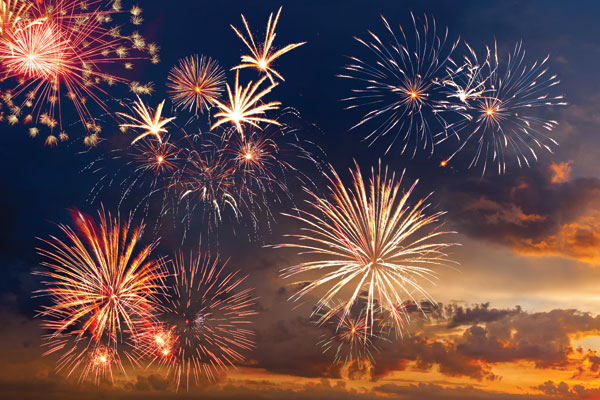Rockets’ Red Glare
Our country turns 237 years old this July. Our town will celebrate the way it always has, with a fireworks show that begins, now that we’re on daylight savings time, somewhere around midnight. For the past 10 years, the fireworks have been shot off from the field by the school. We citizens watch from the parking lot. The adults are relaxed, sitting in lawn chairs carried in for the occasion. The children are hopeful, praying a wayward spark will find its way into a schoolhouse crevice where it will smolder until the deep hours of the morning before bursting into flame, leveling the building while the town slumbers unaware, freeing them from the tedium of education.

When our sons were small, the fireworks were held at the park, launched from the Little League field, while we watched from the sledding hill above the basketball courts. A fear of injury spurred the move. One year, a firework prematurely exploded, showering sparks on a row of onlookers. To me, that is no reason to move. The experience is enhanced when danger lurks. As our country was born in war, it seems fitting our celebration of its birth should likewise entail some risk.
Many annual fetes tarnish over time, but fireworks have never lost their luster. They are as thrilling now as they were when I was a child.
Last year, when the town board canceled them because of the drought and fear of fire, I was as disconsolate as a 5-year-old missing Christmas. A few hardy souls drove to the city to see the fireworks, there being no grass or hayfields to ignite, but I prefer to watch them in the company of friends and compare them to years past.
The year to beat in our town was 1976, when the fireworks were held at the county fairgrounds to accommodate a projected record bicentennial crowd. But the crowd was the same size as always since everyone goes each year, bicentennial or not. The town board, drunk with patriotism, purchased twice the number of fireworks they normally did, plus an American flag ground display, which no one could see since it was flat on the ground.
When the amusement park, King’s Island, opened and townspeople began to go there for vacation, they told of the fireworks that ended each day. This seemed wrong to me, making coarse and common that which was prized for its rarity. Then the Indianapolis symphony began visiting our town each summer for a concert in the park, and had fireworks accompaniment to Sousa’s “Stars and Stripes Forever.” While impressive, it felt decadent, like eating steak and lobster every night for dinner. It was too rich a diet.
But it did not end there. Someone thought it would be good to shoot off fireworks when our high school football team scored a touchdown, so now we have them at every home game in the fall. The basketball team must slog on without such encouragement, it being impractical to shoot fireworks in the school gym.
Though some are concerned with this invasive spread, no one has voiced their concerns aloud, it being un-American to protest fireworks.
So I, being a minister and accustomed to delivering blunt messages, will say what must be said—fireworks outside the Fourth of July are an abomination against God, an unnatural act. It is a return to concubines and multiple wives; it is excess; it is gluttony; it is gilding every surface with gold, so that nothing is precious any longer. It is indicative of our more-is-best culture, which believes that because something is enjoyed one day, it must be had every day. It is kin to the trend of awarding the last place team a trophy for participation, of spreading honors so thin they mean nothing.
Some things, exquisite in scarcity, are garish in abundance. Give me one night each July, in the company of friends, recalling past glories, amidst the sacred sounds of burst and boom.